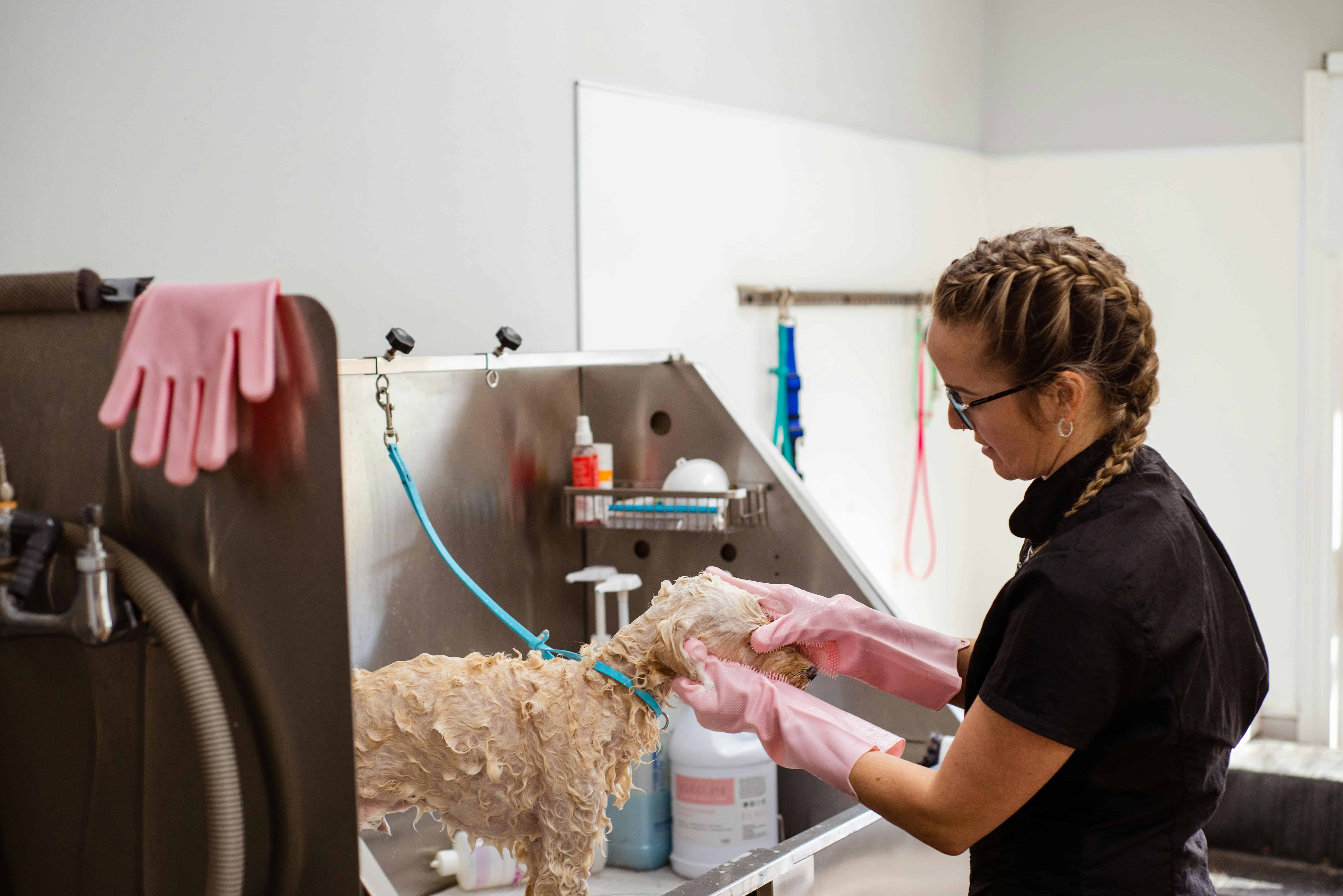Home Remedies for Dogs Itchy Skin
Home Remedies for Dogs Itchy Skin: Safe, Effective Solutions Every Owner Can Try. When my dog, Savannah, started scratching nonstop, I knew something had to change.
Like many dog owners, I wanted quick relief for her but didn’t want to reach straight for harsh chemicals or medications.
I learned there are gentle home remedies for dogs itchy skin that really work—and keep our pups safe and comfortable.
In this article, I’ll share practical, safe treatments you can use at home to soothe your dog’s irritated skin.
These tips focus on real-world solutions that helped Savannah feel better fast. If you want more ways to keep your dog happy, check out our expert dog nutrition advice for American Bully puppies. Let’s get started and help your best friend find relief.
Key Takeaways
When caring for a dog with itchy skin at home, it’s important to understand both the results you can expect and the limits of what home care can do. Over time, you’ll get a feel for which remedies work best for your dog’s unique needs. Here are the most important lessons every pet owner should keep in mind.
Table of Contents
Every Dog’s Skin is Different
One thing I’ve learned is that dogs react differently to the same fix. What soothes one dog’s itchy patch may not work for another.
- Some pups have allergies to food or dust.
- Others might be sensitive to pollen or flea bites.
- Even common remedies like oatmeal baths or coconut oil can have mixed results.
Try one remedy at a time, and keep an eye on how your dog responds. If the itch quickly returns or gets worse, pause and consult your vet.
Natural Doesn’t Always Mean Safe
Just because a remedy uses common items from your kitchen doesn’t guarantee it’s safe for every pup. Always double-check ingredients before trying something new on your dog’s skin.
- Avoid using essential oils unless you’re certain they’re dog-safe.
- Some herbs and household products can actually irritate sensitive skin.
Learn more about the safest ingredients and what to avoid by checking comprehensive guides, such as the one from PetMD on home remedies for dog itchy skin.
Consistency is Key to Relief
It’s tempting to try a new solution and expect instant results. But with itchy skin, routine matters more than a quick fix.
- Dogs often need daily or weekly baths with a gentle shampoo to see real improvement.
- Applying coconut oil or fish oil for a few days won’t be enough—it’s the steady routine that helps.
Keep a notebook of what you try and how your dog responds. This helps you spot patterns and avoid repeating things that didn’t help.
Know When to Call the Vet
Some itchy skin problems need a professional touch. Here’s when to stop home treatments and make that appointment:
- Sudden hair loss, open sores, or bleeding patches.
- Extreme scratching that won’t stop.
- No improvement after a couple of weeks.
Don’t wait too long if your dog is clearly miserable. Some conditions, like mange or severe allergies, need more than home care. If you spot these warning signs, it’s time to ask for expert help.
Helpful Tips for Daily Relief
There are simple steps you can use in your daily routine to give your dog fast, gentle relief:
- Brush your dog regularly to remove loose fur and dirt.
- Wash bedding often—this prevents allergens from lingering.
- Use a humidifier in winter to stop dry air from worsening skin issues.
You’ll find other day-to-day tips in guides like The Spruce Pets’ home remedies for itchy dog skin.

Photo by Torsten Dettlaff
Gentle Remedies Often Work Best
Most times, the simplest home remedies provide comfort without side effects. Oatmeal baths, plain coconut oil, or simple changes like a better diet can calm skin safely for many dogs.
To support long-term skin health, consider reviewing your dog’s food choices. For breed-specific nutritional advice, resources like our dog food reviews for German Shepherds can help.
Remember, home remedies for dogs itchy skin should make life more comfortable for both you and your loyal companion. Steady care, patience, and observation go a long way.
Understanding the Causes of Itchy Skin in Dogs
If you’ve watched your dog scratch, bite, or lick at their skin non-stop, you know how frustrating it can be. Before jumping into home remedies for dogs itchy skin, it’s important to figure out what’s behind all that scratching. Pinpointing the cause helps you provide the right relief and avoid making things worse. Let’s take a closer look at the most common triggers behind itchy skin in dogs. Knowing what’s causing the itch lets you tailor your approach and gives your pup the best chance to finally get comfortable.

Photo by Bruno Cervera
Allergies: The Top Culprit
Allergies rank high on the list of reasons dogs feel itchy. Dogs can develop allergies to almost anything—pollen, grass, cleaning products, flea bites, even certain foods. You might notice symptoms like constant licking of paws, red skin, or runny eyes. Identifying the trigger can take a little detective work, but it’s worth it.
Food allergies might need a diet change, while seasonal allergies could mean more baths after playtime outdoors.
For a deeper understanding, check the VCA Hospitals guide on allergies in dogs.
Signs your dog’s itch is allergy-related often include:
- Persistent scratching even after a bath
- Chewing or licking paws, belly, or underarms
- Chronic ear infections
- Watery eyes or a runny nose
Understanding dog allergies is the first step to stopping the scratch. Learn more about types of allergies and what to watch for.
Environmental Factors
Sometimes, a dog’s environment sparks itchy skin. Think dust, mold, pollen, harsh soaps, or even the laundry detergent used on bedding. Dry air in winter can also dry out skin, making dogs more likely to itch and scratch.
Simple steps like:
- Washing your dog’s bedding often
- Using gentle, fragrance-free detergents
- Keeping your home clean and dust-free
can help lower the risk of environmental triggers.
Nutrition Matters
A poor diet can show up on your dog’s skin. Dogs need a balanced diet filled with the right mix of fatty acids, vitamins, and minerals. If your dog isn’t getting the nutrients they need, their skin barrier weakens, and itching can start.
Sometimes, a food ingredient causes inflammation or allergy-like reactions too.
To avoid nutrition-based skin issues:
- Choose a high-quality dog food.
- Make sure your dog gets omega-3 and omega-6 fatty acids.
- Rule out common food allergens if you notice itchiness after meals.
If you’re interested in making smarter food choices, see our helpful dog nutrition guides.
Parasites: Fleas, Mites, and More
Parasites are a classic reason for itchy skin. Fleas, ticks, and certain types of mites love to make a home in your dog’s coat. Even a single flea bite can trigger intense scratching, especially if your dog is allergic to flea saliva.
You can spot parasite problems if you see:
- Black “flea dirt” in your dog’s fur
- Visible bugs on the skin
- Red, inflamed areas or patchy hair loss
Regular flea and tick prevention is the best defense. If you’re dealing with a current infestation, you’ll need a treatment plan to break the cycle. The VCA Hospitals guide on itching and scratching in dogs breaks down parasite causes and solutions.
Infections: Bacterial and Fungal
Sometimes, constant scratching leads to open skin and, unfortunately, infections. Bacteria or yeast can sneak into these spots, making the itch even worse. Redness, oozing, smelly skin, or crusty patches may point to an infection.
Common causes include:
- Moisture trapped under fur (especially in wrinkly breeds)
- Secondary infection from scratching
- Underlying health problems that lower immunity
Watching for these signs early helps you know when it’s more than just a mild itch. Severe infections will always need help from your vet, but catching problem spots early is key to healing.
Why It’s Important to Figure Out the Cause First
I know it’s tempting to reach for home remedies for dogs itchy skin as soon as you spot scratching. But without knowing the real cause, you could be missing something that needs more than a soothing treatment. Effective relief starts with solving the root problem—not just calming the symptoms. Always keep a close eye on patterns, and don’t hesitate to talk to your vet if you suspect something bigger is at play. With the cause in mind, you’ll be ready to try the right solutions for your furry friend.
Safe & Effective Home Remedies for Dogs Itchy Skin
Many owners want real answers when searching for home remedies for dogs itchy skin. Over the years, I’ve learned simple kitchen staples can provide big relief for our pups. If you’ve already checked for the cause of your dog’s irritation, you may be ready to try these time-tested, gentle treatments. Below, I break down what works, how to use it safely, and why dogs like Savannah found comfort through these remedies.
Oatmeal Baths for Soothing Irritation

Photo by Goochie Poochie Grooming
One of the most trusted home remedies for dogs itchy skin is a relaxing oatmeal bath. Oatmeal acts as a skin protectant and calms inflammation. It works by creating a gentle barrier, locking in moisture, and providing instant itch relief—similar to the way we use it for our own sensitive skin.
Here’s my step-by-step process:
- Grind plain, unsweetened oatmeal into a fine powder using a blender or food processor.
- Fill your tub with warm (not hot) water—just enough to reach your dog’s belly.
- Sprinkle 1 to 2 cups of your oatmeal powder into the water.
- Mix it well and encourage your dog to soak for 10-15 minutes. Gently massage the oatmeal water into the fur and skin, focusing on itchy spots.
- Rinse with clean, lukewarm water and pat dry with a towel.
Oatmeal works fast to reduce redness and itching. When Savannah had a stubborn, scratchy patch on her chest, a weekly oatmeal bath gave her almost instant relief. This remedy is gentle enough for most dogs, even those with sensitive skin.
To learn more about why oatmeal works so well, read this guide on how to make an oatmeal bath for dogs with itchy skin.
Coconut Oil for Moisturizing Dry Skin
Coconut oil can be a simple yet powerful way to soothe dry, flaky skin. It offers hydration, reduces redness, and has natural antibacterial and antifungal properties. Here’s how I safely use coconut oil for Savannah’s skin:
- Warm a small amount of plain, virgin coconut oil in your hands.
- Gently massage the oil onto problem areas, or rub a tiny amount across your dog’s coat if dryness is widespread.
- Leave it on for a few minutes, then wipe away any extra oil with a soft cloth. This prevents stickiness and keeps your pup from licking off too much.
Coconut oil is best for:
- Dogs with dry or mildly irritated skin patches
- Breed types prone to flaky skin
- After a bath, to lock in moisture
A word of caution: Only use a small amount the first time you apply it, to make sure your dog isn’t sensitive. Avoid using coconut oil on dogs prone to oily skin or with a history of yeast infections, as it can sometimes worsen these problems.
Curious about the science and safety? Get a vet’s perspective here: Coconut Oil for Dogs: Potential Benefits and Drawbacks.
Apple Cider Vinegar Spray for Allergy Relief
Apple cider vinegar (ACV) is often recommended for mild, allergy-fueled itchiness. It helps balance the skin’s pH and wards off some bacteria. But dilution and safe use are essential.
How I use it:
- Mix equal parts apple cider vinegar and water (use filtered or distilled water for best results).
- Pour into a spray bottle and shake to combine.
- Lightly spritz on affected areas, avoiding open sores, raw spots, or broken skin. Never use ACV on wounds—it will sting.
ACV spray works best for:
- Seasonal allergies causing light itchiness
- Minor irritation between baths
Always start with a patch test on a small area to check for any reaction. For a detailed guide, see this complete resource on apple cider vinegar for dogs.
Chamomile and Green Tea Soaks for Relieving Inflammation
Natural teas like chamomile and green tea provide a soothing, cooling effect for inflamed or red skin. Both herbs have natural anti-inflammatory powers that help tame hot spots and reduce swelling.
To prepare a tea soak:
- Steep several tea bags (chamomile, green, or a blend) in hot water for 5–10 minutes.
- Let the tea cool completely—lukewarm or cold is best for comfort.
- Pour the cooled tea into a basin or tub, and gently soak your dog’s paws or dab the liquid on irritated spots with a soft cloth.
This approach shines for:
- Dogs with inflamed, itchy feet
- Localized hot spots
- Stress relief after outdoor play
I’ve found that adding chamomile or green tea to Savannah’s bath quickly calmed her most irritated patches, especially in allergy season. For more details and herbal options, check out this guide on herbal remedies for dog itching.
If you’re focused on gentle solutions, you’ll find these are some of the most science-backed home remedies for dogs itchy skin. They’re easy to prepare and often bring fast comfort. Want additional advice on long-term skin health and food choices for your dog? Explore our dog nutrition advice for American Bully puppies for extra insights into caring for sensitive pups.
When to See a Veterinarian
When searching for home remedies for dogs itchy skin, it’s easy to hope a gentle bath or topical oil will do the trick. But sometimes, itchy skin is only a symptom of a deeper problem that home treatments simply can’t fix. Knowing when to put down the natural remedies and call your vet may protect your dog from needless discomfort—or even prevent a more serious health issue from getting worse. Here’s how to spot the warning signs and make the right call for your pup’s well-being.

Photo by Mikhail Nilov
Warning Signs That Require Professional Attention
Certain symptoms call for prompt attention from your veterinarian. If you spot any of these signs, don’t wait—schedule an appointment as soon as possible:
- Open sores, bleeding, or raw areas that do not heal
- Sudden hair loss or bald patches
- Blisters, swelling, or pus
- Persistent scabs or crusty lesions
- Intense scratching, biting, or licking that keeps your dog up at night
- Unusual lumps, bumps, or growths
- Ongoing fever or lethargy paired with itching
- Vomiting or diarrhea in addition to skin problems
- Signs of pain when touched
Some health emergencies need immediate care, such as if your dog is struggling to breathe, collapses, or experiences severe bleeding. The American Veterinary Medical Association lists several emergency symptoms that should never wait for a routine visit.
If your dog acts differently—maybe they hide more, stop eating, or seem unusually tired—always trust your instincts. Even personality changes can hint at skin infections or allergies that need more than home remedies.
What If Home Remedies Aren’t Helping?
Home remedies for dogs itchy skin can offer short-term comfort, but they have their limits. If you notice any of the following, consult your vet:
- No relief after trying home treatments for 1–2 weeks
- Itchiness worsens or spreads to new areas
- Redness, odor, or swelling becomes severe
- Signs of infection (oozing, heat, or pain on touch)
It’s always better to ask for professional advice than risk your dog’s comfort or health. Ignoring persistent symptoms can lead to chronic skin problems or deeper infections. According to experts, missing key warning signs is a common reason dogs suffer longer than necessary. For a broader list of red flags, see the guide on warning signs that indicate your dog needs a vet visit.
Your veterinarian may run allergy tests, check for parasites, or recommend prescription treatments when needed. This kind of targeted care can stop the cycle of itching and get your dog back to their happy, healthy self much faster.
How Regular Vet Visits Can Prevent Problems
Routine check-ups are the best way to catch problems early—even before they lead to chronic itching. Some breeds are more prone to certain skin and health issues than others. For example, if you own a Dachshund or Boxer, you’ll want to learn about their unique needs and potential warning signs, as discussed in breed-specific guides like our Dachshund dog guide and Boxer dog characteristics.
A veterinarian can help you sort out what’s normal and what’s not for your breed, age, or individual dog. Partnering with your vet means peace of mind, faster relief, and a happier life for your four-legged friend.
If you’re ever in doubt, making one call can make all the difference. Your dog’s comfort—and sometimes, their safety—truly depends on timely, professional care.
Preventing Future Itchy Skin Issues
Home remedies for dogs itchy skin can give your pup fast relief, but keeping that pesky itch from returning is just as important. Building healthy routines around diet, grooming, and your home environment helps break the scratch cycle for good.
These practical steps fit easily into everyday life and make a real difference for dogs prone to irritation.

Photo by Christian Domingues
Diet Improvements for Healthy Skin
Feeding your dog a nutrient-rich diet is the cornerstone of skin health. When a dog’s food contains the right balance of fatty acids, vitamins, and minerals, the skin’s barrier stays strong and resilient.
- Choose high-quality commercial foods or consult your vet before switching to homemade meals.
- Look for omega-3 and omega-6 fatty acids in the ingredients list—these support moisture and help defend against irritation.
- Avoid known allergens or ingredients that have triggered past reactions.
Supporting your dog with a smart diet pays off in fewer flare-ups and a shinier coat. For a deep dive into balanced nutrition that benefits both puppies and adults, check out the puppy nutrition guide. It’s full of helpful feeding tips to support strong, itch-free skin.
Regular Grooming Works Wonders
Consistent grooming is more than keeping your dog looking great. It’s a simple way to remove dirt, dead hair, and potential allergens before they start trouble.
A routine grooming plan might include:
- Brushing your dog daily or several times each week, depending on the breed.
- Bathing every few weeks with a gentle shampoo, avoiding harsh or fragranced products.
- Cleaning ears and trimming nails to lower infection risks.
Look for signs of irritation as you groom—early discovery of flakes or redness lets you act before itching escalates.
Environmental Adjustments for Comfort
A clean, comfortable environment plays a big role in preventing future skin problems. Homes are filled with hidden triggers, but small adjustments make a big difference.
- Wash your dog’s bedding weekly using hypoallergenic, fragrance-free detergent.
- Vacuum floors, couches, and your dog’s favorite hangouts to cut down on dust and dander.
- Use a humidifier during dry months to keep skin from drying out.
- Limit exposure to known irritants like certain plants, cleaners, or air fresheners.
Tuning into your dog’s environment can stop itch triggers before they start.
Keep Up With Regular Health Checks
Routine visits to the vet help catch budding skin issues early. Health checks allow for quick action on hidden allergies, infections, or signs of chronic conditions.
- Schedule annual check-ups or follow your vet’s suggested timeline.
- Talk about any changes in your dog’s scratching, skin appearance, or behavior.
- Ask which skin supplements or topical products might be right for your breed or age group.
Taking a proactive approach is your best shield against future problems.
Parasite Prevention: A Must for Every Dog
Fleas, ticks, and mites are top troublemakers when it comes to itchy skin. Even well-cared-for dogs can pick up pests during walks or from other pets.
- Use vet-approved preventatives year-round (not just during warm months).
- Inspect your dog’s coat after hikes or outdoor play.
- Treat all pets in the household, since pests spread fast.
If you notice persistent scratching despite your efforts, recheck for parasites and ask your vet for the next steps.
Building long-term comfort is about forming smart habits, not chasing a quick fix. Balanced nutrition, regular grooming, a clean space, and steady health care all work together to keep itchy skin from returning. The reward? A happier, more comfortable pup—with fewer interruptions for scratching.
Frequently Asked Questions About Home Remedies for Dogs Itchy Skin
Dealing with a dog’s itchy skin can lead to a lot of questions. I’ve pulled together the most common concerns and answers to help you make smart, safe choices for your pup. This section clears up confusion, offers practical tips, and sets you up to confidently try home remedies for dogs itchy skin.
Can I Use Human Ointments or Creams on My Dog’s Skin?
Most over-the-counter creams made for humans aren’t safe for dogs. Ingredients like zinc oxide, found in many diaper rash creams, can be toxic if licked or ingested. Stick to products labeled for veterinary use or safe home remedies like oatmeal or coconut oil. If your dog’s itch is severe, it’s always best to ask your vet before reaching for any topical product.
How Often Can I Give My Dog an Oatmeal Bath?
Oatmeal baths are gentle enough for frequent use—usually once or twice a week is perfect for mild irritation. For chronic itching, you can use them more often, but watch your dog’s response. If the skin gets dry or flaky, cut back a bit. Oatmeal is safe for most dogs and won’t strip natural oils the way harsh shampoos might.
Is Apple Cider Vinegar Safe for All Dogs?
Apple cider vinegar can ease mild itching, but only when properly diluted (equal parts vinegar and water) and never on broken skin. If your dog has open sores, wounds, or raw patches, skip the vinegar spray to avoid stinging.
Always do a small patch test to rule out any reaction. For more about safe ingredients, you can check pet health resources like this safety guide for ACV use on dogs.
What Should I Do If My Dog Licks Off Coconut Oil or Other Remedies?
It’s normal for dogs to lick areas that have been treated with coconut oil or other natural remedies—most of these ingredients are harmless in small amounts. Still, use only a thin layer and gently wipe away any excess to avoid upset stomachs. If your dog has a history of food sensitivities, monitor for any signs of stomach trouble after use.
Can Diet Changes Really Help with Itchy Skin?
Yes, diet can have a huge impact. Dogs need essential fatty acids and balanced nutrients to keep skin strong. For ongoing itch, talk to your vet about trying new proteins, switching to hypoallergenic dog food, or using skin supplements.
If you’re interested in supporting your dog’s skin from the inside out, see how balanced nutrition helps in articles like this guide on puppy nutrition.
Are There Any Breeds More Prone to Itchy Skin?
Some breeds, like Bulldogs, Shar Peis, and Retrievers, are more likely to have skin problems. Their genetics, coat types, and skin folds make them prone to allergies or irritation. If your dog is a breed known for sensitive skin, extra care with grooming, diet, and home remedies pays off.

Photo by Lisá Yakurím
When Should I Stop Home Remedies and Head to the Vet?
If your dog’s itch leads to wounds, spreads quickly, or doesn’t improve after a couple of weeks, it’s time to call your vet. Other warning signs include hair loss, swelling, pus, or big changes in your dog’s mood. Sometimes skin issues point to deeper health problems that only a professional can treat.
Can I Prevent Future Flare-Ups?
Consistent grooming, smart nutrition, and flea prevention make a huge difference in stopping the itch before it returns. Creating a routine and sticking to gentle, proven remedies are your best tools for keeping your dog happy long-term.
If you want more tips on building a full dog care plan, browse helpful guides like are Boxers good dogs? Exploring their traits for practical advice on overall dog health.
These answers should help you feel ready to tackle itchy skin at home with safe, proven choices. Always keep your pet’s comfort and safety in mind as you try new remedies.
Conclusion
Safe, steady routines bring the best results for dogs with itchy skin. Using proven home remedies for dogs itchy skin—like oatmeal baths or gentle oils—can offer real comfort. The key is to stay watchful. Notice how your dog reacts and reach out to your vet if anything seems off or the itch lingers.
You have good options at home, but medical issues may call for more than simple care. Keep making smart choices about your dog’s food, hygiene, and daily habits. Supporting your dog with safe home routines not only helps with itching but builds a stronger bond over time.
Thanks for taking the steps to help your dog feel better. Watching Savannah scratch less and enjoy life again reminds me why these efforts matter.
If you’re looking for more tips on nutrition or daily care, explore in-depth resources on topics like dog nutrition advice for American Bully puppies. Your patience and attention make all the difference for your dog’s comfort and happiness.







